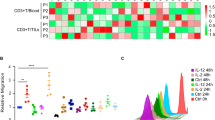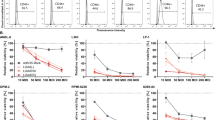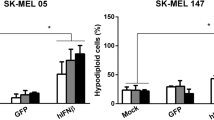Abstract
To enhance the NK population induced by Herpes Simplex virus thymidine kinase (HSV-tk) gene transduction and ganciclovir (GCV) treatment, adenovirus-mediated (Ad) expression of IL-12 was added to Ad.HSV-tk + GCV as combination gene therapy. This approach resulted in improved local and systemic growth suppression in a metastatic model of mouse prostate cancer (RM-1). In vitro assay of tumor infiltrating lymphocytes noted superior lysis of both RM-1 and Yac-1 targets with combination therapy, but in vivo depletion of NK cells only negatively impacted on systemic growth inhibition. TUNEL assay of primary tumors noted induction of apoptosis between two and four times higher than controls lasting for 6–8 days post-vector injection. After demonstrating that Ad.HSV-tk/GCV and Ad.mIL-12-induced IFN-γ independently up-regulated expression of FasL and Fas, respectively, studies examined tumor cell-mediated death through Fas/FasL-induced apoptosis as a mechanism of primary tumor growth suppression. In vitro, combination therapy at low vector doses resulted in synergistic growth suppression, which could be negated by the addition of anti-FasL antibody. In vivo co-inoculation of an adenovirus expressing soluble Fas resulted in combination therapy-treated tumors, which were three times larger than expected, and a reduction in apoptosis to baseline levels. In FasL knockout mice, combination therapy maintained the superior results experienced in wild-type mice, indicating that tumor cell, not host cell FasL, was responsible for Fas transactivation. Therefore, the combination of Ad.HSV-tk/GCV + Ad.mIL-12 results in enhanced local growth control via apoptosis due to tumor cell expression of Fas and FasL and improved anti-metastatic activity secondary to a strong NK response.
This is a preview of subscription content, access via your institution
Access options
Subscribe to this journal
Receive 12 print issues and online access
$259.00 per year
only $21.58 per issue
Buy this article
- Purchase on Springer Link
- Instant access to full article PDF
Prices may be subject to local taxes which are calculated during checkout




Similar content being viewed by others
References
Barba D., Hardin J., Sadelain M., Gage F.H. . Development of anti-tumor immunity following hymidine kinase-mediated killing of experimental brain tumors Proc Natl Acad Sci USA 1989 91: 4348 4348
Kianmanesh A.R. et al. A ‘distant’ bystander effect of suicide gene therapy: regression of nontransduced tumors together with a distant transduced tumor Hum Gene Ther 1997 8: 1807 1807
Bi W. et al. An HSVtk-mediated local and distant antitumor bystander effect in tumors of head and neck origin in athymic mice Cancer Gene Ther 1997 4: 246 246
Yamamoto S. et al. Herpes simplex virus thymidine/ganciclovir-mediated killing of tumor cells induces tumor-specific cytotoxic T cells in mice Cancer Gene Ther 1997 4: 91 91
Hall S.J. et al. Adenoviral-mediated herpes simplex virus thymidine kinase gene and ganciclovir therapy leads to systemic activity against spontaneous and induced metastasis in an orthotopic model of prostate cancer Int J Cancer 1997 70: 183 183
Chen S.H. et al. Combination gene therapy for liver metastasis of colon carcinoma in vivo Proc Natl Acad Sci USA 1995 92: 2577 2577
Chen S.H. et al. Combination suicide and cytokine gene therapy for hepatic metastases of colon carcinoma: sustained antitumor immunity prolongs animal survival Cancer Res 1996 56: 3758 3758
Coll J.L. et al. Long-term survival of immunocompetent rats with intraperitoneal colon carcinoma tumors using herpes simplex thymidine kinase/ganciclovir and IL-2 treatments Gene Therapy 1997 4: 1160 1160
Castleden S.A. et al. A family of bicistronic vectors to enhance both local and systemic antitumor effects of HSVtk or cytokine expression in a murine melanoma model Hum Gene Therapy 1997 8: 2087 2087
Felzmann T., Ramsey W.J., Blaese R.M. . Characterization of the antitumor immune response generated by treatment of murine tumors with recombinant adenoviruses expressing HSVtk, IL-2, IL-6 or B7-1 Gene Therapy 1997 4: 1322 1322
Hall S.J., Sanford M.A., Atkinson G., Chen S.H. . Induction of potent antitumor natural killer cell activity by herpes simplex virus-thymidine kinase and ganciclovir therapy in an orthotopic mouse model of prostate cancer Cancer Res 1998 58: 3221 3221
Hendrzak J.A., Brunda M.J. . Interleukin-12: biologic, activity therapeutic utility and role in disease Lab Invest 1995 72: 619 619
Sanford M.A. et al. Independent contributions of Gr-1+ leukocytes and Fas/FasL interactions to induce apoptosis following IL-12 gene therapy in a mouse model of prostate cancer Hum Gene Ther 2001 12: 1485 1485
Hassen W. et al. Prospects for HSV-tk and cytokine gene transduction as immunomodulatory gene therapy for prostate cancer World J Urol 2000 18: 130 130
Weller M. et al. Anti-Fas/APO-1 antibody-mediated apoptosis of cultured human glioma cells. Induction and modulation of sensitivity by cytokines J Clin Invest 1994 94: 954 954
Beltinger C. et al. Herpes simplex virus thymidine kinase/ganciclovir-induced apoptosis involves ligand-independent death receptor aggregation and activation of caspases Proc Natl Acad Sci USA 1999 96: 8699 8699
Wei S.J. et al. Involvement of Fas (CD95/APO-1) and Fas ligand in apoptosis induced by ganciclovir treatment of tumor cells transduced with herpes simplex virus thymidine kinase Gene Therapy 1999 6: 420 420
Eastham J.A. et al. Prostate cancer gene therapy: Herpes Simplex virus thymidine kinase gene transduction followed by ganciclovir in mouse and human prostate models Hum Gene Ther 1996 7: 515 515
Liu Q.Y. et al. Fas ligand is constitutively secreted by prostate cancer cells in vitro Clin Cancer Res 1998 4: 1803 1803
Thompson T.C., Southgate J., Kitchner G., Land H. . Multi-stage carcinogenesis induced by ras and myc oncogenes in a reconstituted organ Cell 1989 56: 917 917
Baley P.A. et al. Progression to androgen insensitivity in a novel in vitro mouse model for prostate cancer J Steroid Biochem Mol Biol 1995 52: 403 403
Chen S.H. et al. Gene therapy for brain tumors: regression of experimental gliomas by adenovirus-mediated transfer in vivo Proc Natl Acad Sci USA 1994 91: 3054 3054
Caruso M. et al. Adenovirus-mediated interleukin-12 gene therapy for metastatic colon carcinoma Proc Natl Acad Sci USA 1996 93: 11302 11302
Acknowledgements
These studies were supported by the Edwin Beer Award from the New York Academy of Medicine and DOD grant PC 99-1108, both to SJH, and NCI R01 CA70337 to SHC.
Author information
Authors and Affiliations
Rights and permissions
About this article
Cite this article
Hall, S., Canfield, S., Yan, Y. et al. A novel bystander effect involving tumor cell-derived Fas and FasL interactions following Ad.HSV-tk and Ad.mIL-12 gene therapies in experimental prostate cancer. Gene Ther 9, 511–517 (2002). https://doi.org/10.1038/sj.gt.3301669
Received:
Accepted:
Published:
Issue Date:
DOI: https://doi.org/10.1038/sj.gt.3301669
Keywords
This article is cited by
-
Overview of the pre-clinical and clinical studies about the use of CAR-T cell therapy of cancer combined with oncolytic viruses
World Journal of Surgical Oncology (2022)
-
Cancer-specific targeting of a conditionally replicative adenovirus using mRNA translational control
Breast Cancer Research and Treatment (2008)
-
Gene therapy for hepatocellular carcinoma using sonoporation enhanced by contrast agents
Cancer Gene Therapy (2005)
-
Adenovirus-mediated tumor-specific combined gene therapy using Herpes simplex virus thymidine/ganciclovir system and murine interleukin-12 induces effective antitumor activity against medullary thyroid carcinoma
Cancer Gene Therapy (2004)
-
Quantification and characterization of the bystander effect in prostate cancer cells following adenovirus-mediated FasL expression
Cancer Gene Therapy (2003)



